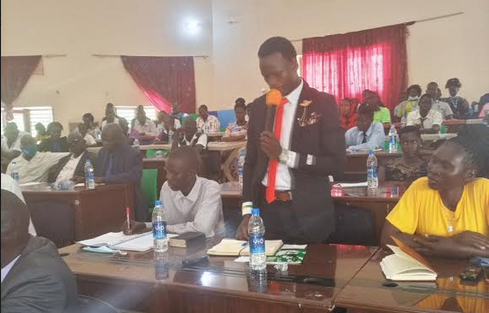School-going children and other young people in Torit in Eastern Equatoria State on Tuesday decried the centralized system of issuing National Identity Cards and passports in South Sudan.
The young people raised their concerns during the second sitting of the children and young people’s parliament organized by Plan International in partnership with the Eastern Equatoria State transitional legislative Assembly.
The Sitting under the theme “building the future of children and young people in South Sudan” aimed at discussing challenges faced by young people in the realization of their safe space, rights, and responsibilities.
The young people said most of them cannot afford to travel to acquire National Identity Cards which has limited their access to scholarships and employment.
At the moment, passports and National Identity Cards are issued only in the capital Juba although the Directorate for Civil Registry, Nationality, Passports, and Immigration (DCRNPI) has in the past sent out teams to issue them in the different states.
Sadrak Simon, a member of the children’s and young people’s parliament, said he has not been accessing public services because he has no National Identity Card and he argued that the issuance should be decentralized.
“Young people face challenges in accessing National Identity Cards in Eastern Equatoria State and without it, they cannot access public services and find jobs both in the public and private sectors and students cannot get government scholarships, Sadrak said. “We need to critically analyze and voice for support of young people and women following this question. Should young people keep staying without National Identity Cards? How can women and youth contribute to the coming election and participate in nation-building without National Identity Card?”
“How can women and the youth open bank accounts without National Identity Cards, yet it is a requirement?” he added.
Auma Kevin, a female member of the mock parliament, said high transport and accommodation costs make it hard for locals to get the identity cards and urged the national interior ministry to reduce the cost of processing the National Identity Card.
“How will this child who does not even have money for transport and access to the immigration office acquire this National Identity Card?” she said. “Some people are from very poor families and cannot even afford to pay for accommodation. Assuming you do not have relatives in that place, you need to pay for accommodation and transport.”
However, another speaker, Knight Jonathan, disagreed with the other speakers and said decentralizing the issuance of the National Identity Cards will lead to abuses in the system which foreigners can exploit to get the identity card.
“I want to disagree with the other speakers. South Sudan borders different countries so when we say the issuance of the National Identity Card should be decentralized and brought to the grassroots level, it means we are going to sell our National Identity Cards to foreigners,” he said. That is why I said it should not be brought to the grassroots level.”
On her part, the deputy speaker of the Eastern Equatoria State parliament, Betty Hope, said she was impressed with the debate and assured the youth that their concerns will be addressed.
“This is a very good presentation that you people have made and you have challenged us and we are very impressed,” she said. “Now you know your potential and next time you can debate and come to the parliament.
The forum brought together children and young people from Eastern Equatoria and representatives from Central Equatoria State, consortium partners, Plan international, state officials, youth, parliamentarians, and other stakeholders.




